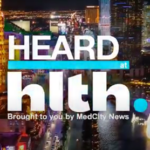
The HLTH conference held in Las Vegas this week gave healthcare leaders the opportunity to convene, network and share ideas. It also brought a bevy of news announcements, from partnerships to new product features to acquisitions and more.
Below are 11 notable announcements made during the conference.
1. General Catalyst wants to buy a health system
Venture capital firm General Catalyst launched a new company named Health Assurance Transformation Corporation, or HATCo for short. The company, which will be led by former Intermountain Health CEO Marc Harrison, is focused on three things.
Firstly, the company plans to work with its more than 20 health system partners to provide advisory services that help them deploy better technology. It also plans to develop an interoperability model for technology solutions, drawing on some of General Catalyst’s portfolio companies to drive this effort. Lastly, HATCo plans to acquire and operate a health system so that the company can “demonstrate the blueprint of this transformation for the rest of the industry,” the venture fund said.
2. Uber, Optum join forces
Uber and Optum announced Sunday that they are working together to help patients of participating health plans pay for certain expenses through the Uber app. The partnership combines Optum’s health payment platform with Uber’s transportation services and network of grocery and retail stores.
Starting in 2024, members of select Medicare Advantage plans will be able to add health plan benefit cards issued by Optum’s payment platform as a form of payment in the Uber app. These members will be able to use their benefit cards to pay for health-related rides, over-the-counter items and healthy food. In the future, the companies plan to expand this service to Medicaid and commercial health plans.
3. Walgreens to begin delivering direct-to-consumer virtual care
Walgreens said it will begin offering direct-to-consumer virtual healthcare services later in October. These virtual visits will treat common health concerns, like allergies, birth control, erectile dysfunction and flu.
Patients cannot use insurance to pay for these visits. Walgreens will charge $33 for chat-based visits, and pricing for video visits will range from $36 to $75.
To begin, Walgreens is rolling out its virtual visit services in nine states — California, Florida, Georgia, Illinois, Michigan, Nevada, North Carolina, Ohio and Texas. These states make up nearly half of the U.S. population, and the company has plans to expand these services to additional states in the future, Walgreens said.
4. Evernorth buys Bright.md’s technology platform
Evernorth Health Services announced Tuesday that it plans to improve MDLive’s virtual care by acquiring Bright.md’s technology. Bright.md offers asynchronous care, triage and care navigation services. By acquiring this technology, MDLive will be able to offer asynchronous care through its virtual urgent care platform to patients in 2024.
“We know firsthand the power of asynchronous care to treat a wide range of common conditions that currently make up more than half of urgent and primary care visits, such as rashes, urinary tract infections, and pink eye,” said Bright.md CEO Steve Giannini in a statement. “Bringing Bright.md’s technology together with MDLive has exciting potential to expand access to care for millions more people—alleviating administrative burden on clinicians and improving outcomes.”
MDLive is also improving its virtual primary care offering by including health coaching for patients with chronic conditions.
5. Microsoft rolls out new analytics, AI tools for healthcare
Microsoft introduced new data and AI capabilities that will help healthcare organizations better manage their vast data and turn it into insights.
In May, the tech giant unveiled Microsoft Fabric, an end-to-end platform that unifies the data and analytics tools organizations need to make the most of their data. With its HLTH announcement, Microsoft launched the platform’s first industry-specific data solutions.
Healthcare organizations can access these tools in preview. The platform promises to help organizations combine data from previously siloed sources, such as EHRs, labs systems, medical devices and claims systems. It can also help organizations de-identify clinical data, enable more personalized engagement with patients and build standardized AI models to glean insights from their data.
6. Best Buy will start selling continuous glucose monitors
Best Buy will soon start selling the Dexcom G7 Continuous Glucose Monitoring System (CGMs) to eligible customers. Patients will be able to start the process of getting a CGM by visiting Wellness.BestBuyHealth.com. Clinicians from the virtual care platform Wheel will determine if patients are eligible for a CGM. If the clinician approves the patient for a CGM, then the prescription will be processed by pharmacy technology provider HealthDyne. The device will then be delivered to the patient’s home.
By working with Best Buy, Wheel aims to ultimately improve access to these devices and virtual services for patients with diabetes, said Michelle Davey, co-founder and CEO of Wheel, in an interview.
7. Google unveils new generative AI capabilities for healthcare
Google Cloud added new capabilities to Vertex AI Search, its platform that helps healthcare organizations build generative AI-powered search engines for their data. The new capabilities aim to help clinicians quickly access patients’ clinical notes and other medical data across various sources.
The new Vertex AI Search capabilities integrate with Google Cloud’s healthcare API and healthcare data engine, as well as Care Studio, the tech giant’s tool to help providers search health records. Google Cloud customers can sign up for early access to the new features — the company is awaiting feedback from early adopters.
8. Oura rolls out new features, teams up with Headspace and Thrive Global
Oura announced three new features on Tuesday to help consumers manage their stress. The company is known for the Oura Ring, a smart ring that offers data and guidance on sleep, activity and other areas.
Two of the three features — Daytime Stress and Reflections — are available to consumers now. Daytime Stress takes frequent readings of users’ biometrics, such as heart rate, heart rate variability and temperature. This helps users understand what activities cause them stress and what relaxes them. The Reflections feature is an AI-powered journal in the Oura app. Members can record themselves talking and the app will transcribe the text into a journal entry.
The third feature is Stress Resilience, which will be available this winter. Stress Resilience provides an assessment of “members’ ability to withstand physiological stress” by measuring their daytime stress load, daytime recovery and recovery while sleeping. It also offers education and recommendations to manage stress.
ŌURA also announced it is partnering with Headspace to offer meditations, guided breathwork and muscle relaxation exercises in the Oura app. In addition, it is working with Thrive Global, which will offer sleep and stress management challenges on its platform and will give users the option to integrate sleep and stress data from Oura.
9. Health systems, payers launch collaborative for responsible generative AI deployment
More than 30 health systems and payers from across the country came together to launch a collective called VALID AI — which stands for Vision, Alignment, Learning, Implementation and Dissemination of Validated Generative AI in Healthcare. The collective aims to explore use cases, risks and best practices for generative AI in healthcare and research, with hopes to accelerate responsible adoption of the technology across the sector.
UC Davis Health will lead the collaborative, along with the other University of California health systems. Some other members include Elevance, Cedars-Sinai, CommonSpirit Health, Houston Methodist, Michigan Medicine and Yale New Haven Health System.
10. Sutter Health plans to build a health innovation center
Sutter Health, a health system with headquarters in Sacramento, announced plans to open a healthcare innovation center in San Francisco. The center will serve as the home base for the health system’s internal innovation team, as well as a place for Sutter’s students, physicians and other workers to explore ideas and build technology models.
The center will invest and partner with venture firms and early-stage digital health startups to develop and test new products and services. Sutter said it plans to have the center up and running by early next year.
11. Clear goes deeper into healthcare with two new partnerships
Clear, a company originally founded to help travelers breeze through airport security lines, is moving further into the healthcare space. It announced two new partnerships during HLTH — one with patient matching platform Verato and one with b.well Connected Health, a company seeking to improve the patient experience.
Clear is coming together with Verato to provide healthcare organizations with a digital identity verification process that their patients can use across their care journey. As for the company’s partnership with b.well, Clear is integrating its digital identity verification technology into the startup’s solutions so that patients can access their health data, schedule visits and join telehealth appointments without repetitive log-ins.
Photo: HLTH















